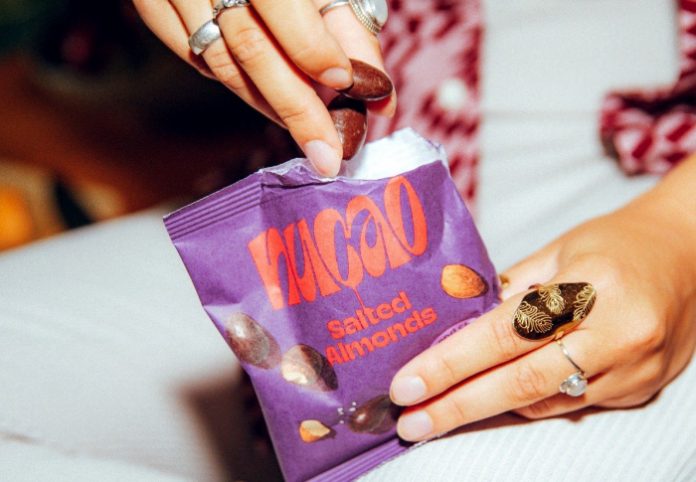
Oberkirch/Germany – Leipzig-based chocolate start-up nucao is going the whole hog on sustainable chocolate. Founded in 2016, nucao is the first chocolate manufacturer in the market to embrace primary packaging made from paper and has been using it for its chocolate products ‘nucao fruits’ and ‘nucao nuts’ since the end of 2022.
The flexible packaging paper Koehler NexPlus Advanced from Koehler Paper that nucao has chosen has an oxygen, mineral oil, and grease barrier, which is necessary for applications where there is direct contact with chocolate and nuts.
Making this switch to paper packaging enables nucao to meet key consumer demand for greater sustainability and to lead the way in the chocolate market with how it chooses to package its products, the company said in a press release.
Sustainable products and packaging
nucao’s products are vegan and made using organic ingredients and fair trade, ecologically cultivated cocoa. Their packaging is also environmentally-friendly. Every product sold helps to support reforestation projects in Nepal and Madagascar. The B Corp-certified start-up donates 3% of its revenue to its reforestation partner Eden Reforestation Projects. 14 million trees have been planted to date.
Its mission to make chocolate as sustainable as possible has led to it choosing sustainable packaging solutions. The new chocolate-coated fruit and nut products have been packaged in flexible packaging paper from Koehler Paper since the end of 2022, making nucao the first supplier in the chocolate market to use primary packaging that is exclusively made of paper.
Christoph Wachter, head of the Flexible Packaging Paper division at Koehler Paper, says: “We are delighted that nucao is relying on our innovative barrier paper for its chocolate-coated fruit and nut products and that nucao is leading the way in its market with this move.” Koehler Paper presented its initial mock-ups for a 100 g chocolate bar using its innovative new product at the industry trade fair FachPack in Nuremberg, Germany, in late September 2022.
Koehler NexPlus Advanced
In early 2021, Koehler Paper launched new secondary packaging on the market with Koehler NexPlus Seal, which has since been used by numerous brand owners. The latest innovation from Koehler, NexPlus Advanced, is an evolution of Koehler Paper’s barrier concept, with the aim of replacing plastic as a packaging material where appropriate.
Koehler NexPlus Advanced’s oxygen, mineral oil, and grease barrier make it ideal for direct contact with food. It also has good printing properties in gravure, flexographic, and digital printing, which is important when it comes to product communication with the end consumer. Compared to traditional plastic packaging, flexible paper packaging reduces the CO2 footprint significantly and provides a positive image transfer to the product and company brand.
The Koehler NexPlus Advanced packaging used for nucao fruits & nut means it is 100% made from paper and can be placed in the paper recycling after use. The recycling process for paper is well established in Europe, which is why multiple reuses of the paper fibers is guaranteed in keeping with the concept of a circular economy.
Switch to paper packaging
Consumer demand for greater sustainability in consumer products is unequivocal. According to studies and surveys, the majority of consumers in Europe prefer to buy food in packaging that contains little to no plastic. Many of them are willing to pay a higher price for the privilege.
Mathias Schwarz, Sustainable Packaging engineer at nucao, describes the qualification process that Koehler NexPlus Advanced went through for use at nucao as follows: “We opted for Koehler NexPlus Advanced 75 g after extensive tests. In addition to product protection, which was assessed using storage tests with subsequent sensory analysis, the fact that the paper could be recycled in the paper recycling was an important factor. Another important point for us was its rating of 19 out of a possible 20 points from the environment service provider Interseroh.”
Brand-name manufacturers and packing companies looking to change to recyclable paper packaging often have to absorb significant investment costs. Christoph Wachter adds: “In many cases, you simply need to adjust a few parameters on existing packaging machinery to optimize the sealing temperatures or sealing times, for instance. But these are all straightforward measures.










